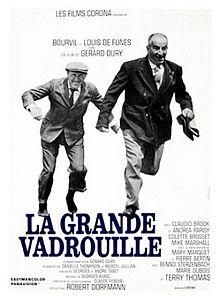| La Grande Vadrouille | |
|---|---|
French theatrical release poster  | |
| Directed by | Gérard Oury |
| Produced by | Robert Dorfmann |
| Written by | Marcel Jullian Gérard Oury Danièle Thompson Georges Tabet André Tabet |
| Starring | Bourvil Louis de Funès Claudio Brook Terry-Thomas |
| Music by | Georges Auric Hector Berlioz |
| Cinematography | André Domage Alain Douarinou Claude Renoir |
| Edited by | Albert Jurgenson |
Production company | |
| Distributed by | Valoria Films (France) Rank Film Distributors (UK) Constantin Film (W. Germany) Buena Vista Distribution Company (US) |
Release date | 8 December 1966 (France) 5 May 1968 (UK) |
Running time | 132 minutes |
| Country | France United Kingdom |
| Language | French English German |
| Budget | $2.3 million |
| Box office | $33 million (France)[1] |
La Grande Vadrouille (French pronunciation: [la ɡʁɑ̃d vaˈdʁuj]; literally "The Great Stroll"; originally released in the United Kingdom as Don't Look Now... We're Being Shot At!) is a 1966 French-British comedy film set in 1942 about French civilians who help the crew of a Royal Air Force bomber shot down over Paris to make their way through German-occupied France to safe territory.
For over forty years La Grande Vadrouille was the most successful French film in France, topping the box office with over 17,200,000 cinema admissions. It remains the fifth most successful film ever in France (on the basis of admissions), of any nationality, behind the 1997 version of Titanic, French hits Bienvenue chez les Ch'tis (2008) and Intouchables (2011), which were seen by over 19,000,000 cinemagoers and Snow White and the Seven Dwarfs.[2][3]
Plot
On a summer day in 1942 a damaged RAF bomber strays over Paris and is shot down by German flak. After planning to reconvene in the Turkish baths at the Grand Mosque of Paris, three crew members parachute out safely. Sir Reginald lands in Vincennes Zoo and, given civilian clothes by a friendly zoo keeper, heads for the baths. Peter Cunningham lands on the platform of a house painter, Augustin, from where he is clothed and hidden by a puppet show operator, Juliette, while Augustin goes to the baths on his behalf. Alan MacIntosh lands on the Opéra Garnier, where he is reluctantly clothed and hidden by the chief conductor, Stanislas, who goes to the baths for him.
All this time, the German military under Major Achbach furiously pursue the three and their helpers. By nightfall the Resistance has arranged for the aviators, together with Augustin and Stanislas who are now wanted men, to be conducted by Juliette to a safe hotel at Meursault, from where they can cross the line of demarcation to the free zone, or "Vichy France". After numerous misadventures the fugitives are rescued from German-occupied territory by a Resistance nun with a horse-drawn wagon. Pursued by half-track armoured vehicles and a spotter plane, she whisks them to a shuttered gliding club, where all six launch two gliders and through machine-gun fire fly to safety.
Cast
- André Bourvil as Augustin Bouvet
- Louis de Funès as Stanislas Lefort
- Terry-Thomas as Sir Reginald ("Big Moustache")
- Claudio Brook as Peter Cunningham
- Mike Marshall as Alan MacIntosh
- Marie Dubois as Juliette
- Pierre Bertin as Juliette's grandfather
- Andréa Parisy as Sister Marie-Odile
- Mary Marquet as The Mother Superior
- Benno Sterzenbach as Major Achbach
- Colette Brosset as Madame Germaine, hotel manager
- Guy Grosso as a musician
- Jean Droze as a musician
- Paul Préboist as a fisherman
Production
The film was made by the same team (Oury, Bourvil and de Funès) who did the enormously successful The Sucker (1965).[4] It was shot at the Billancourt Studios in Paris with extensive location shooting around France. The film's sets were designed by the art director Jean André.
Reception
The film was the most popular of 1966 at the French box office (and the most popular and highest-grossing of all-time) with admissions of 17,275,169 and a gross of $32,994,000.[1] (This was almost twice as much as the second most popular, Dr Zhivago, which had 9,816,305 admissions and a gross of $16,536,000.)[5][1]
The film features in the 2018 film Roma.
Legacy
A specific scene in the film where several dozen German officers of many branches hop around in circles around tables while holding chairs underneath them has become a lesser-known meme, paired with Yeah Yeah Yeahs' song "Heads Will Roll".[6]
See also
References
- ^ a b c "Biggest Grossers In France Over The Last 18 Yrs". Variety. May 12, 1976. p. 268.
- ^ Data on fr:Allociné
- ^ "Les Ch'tis plus forts que La Grande vadrouille", Olivier Corriez, TF1
- ^ "La Grande Vadrouille". Box Office Story.
- ^ "1966 French box office". Box Office Story.
- ^ "Aforementioned Meme". YouTube.
External links
- La Grande Vadrouille at IMDb